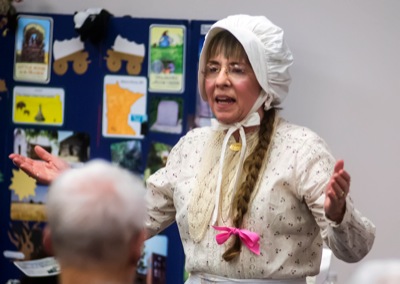Wednesday, February 8th, 2017
Elections board officials discuss space concerns
By William Kincaid
CELINA - Mercer County Board of Elections officials continue to ponder moving to a bigger site.
Located on the first floor of the county courthouse, the office is cramped for space, especially during early voting season when staff members must set up voting equipment in the corridor and lobby area on the east side of the courthouse.
Director Laura Bruns told board members on Tuesday that she had spoken with county commissioner Rick Muhlenkamp last week. She said he is aware the board has outgrown its space.
"There's a lot of discussion about different ways the county can go with creating some additional space," Bruns said.
Moreover, some county officials have been talking about courthouse security, she said.
"All of that is kind of evolving at this time," she said.
Board chairman Phil Long said it's important that staff members communicate with commissioners.
Board member Del Kramer said many county boards of elections aren't located within courthouses.
"To me it would seem that if we had a place that was away from the courthouse - especially with all the early voting that goes on all the time - that would sure suit the board of elections better just for that reason," Kramer said. "You can have your own hours. You don't have to always be worrying about locking this place up."
"But we don't control that," he added.
Board member Craig Klopfleisch pointed to security concerns during early voting sessions on weekends and other times when no other courthouse office is open.
"The whole building's open, all four entrances," he said. "Somebody could have come in and been anywhere in this building and we'd have never known it."
Board members took no action on the matter.
Board members also reviewed a post-election report compiled by Bruns and fellow director Deb Sneddon. Klopfleisch, a Democrat, and Kramer, a Republican, got into a political disagreement of sorts over language in the report.
A lower court decision upheld a law eliminating days on which people could register and vote at the same time, a period known as the golden week. Democrats had claimed the reduction, along with other voting changes, disproportionately burdened black voters and those who lean Democratic.
The state's attorneys argued that scrapping the days helped alleviate administrative burdens while reducing costs and potential fraud.
The 6th U.S. Circuit Court of Appeals in Cincinnati had ruled the golden-week cut still allows for "abundant" opportunities to vote within a 29-day window. Prior to the law, Ohioans had had a 35-day period.
The Supreme Court denied the Democrats' request to put that decision on hold while they appealed.
Klopfleisch objected to the phrase "generous early voting period" in the county's report, requesting the word "generous" be struck out.
"Because obviously there's difference in opinion," Klopfleisch argued, noting some people were upset that the early voting period was reduced.
The report was edited yet Kramer disagreed with Klopfleisch's contention.
"I do think it was a very generous period," he said. "If you can't find enough time to vote in that time, then something's wrong."
The county report highlights local statistics about the general election.
"Overall turnout was slightly lower than expected," the report states. "Of the 28,738 voters eligible, 22,053 voters (76.74 percent) chose to cast a ballot, compared to a 73.94 percent turnout in the last presidential election."
Furthermore, 64 percent of Mercer County voters in the general election cast their ballots in person at the polls rather than through early voting opportunities, the report states.
Board members also,
• reviewed the office's budget. In 2016, $478,277 was allocated from the county's general fund to the board of elections. The board ended up returning $200,978 to the county.
"The office is very aware and really tries to stay within the budget and by returning the amount that we have, I think that's commendable," Long said.
The board of elections' budget this year is $417,814, much less than 2016's total because not as many elections are scheduled.
• approved the petitions of candidates who filed to run in the May 2 primary election: Jason King, R-Celina, Celina City Council president; Myron Buxton, R-Celina, Celina City Council Ward 1; Eric Baltzell, R-Celina, Celina City Council Ward 2; Eric Clausen, R-Celina, Celina City Council Ward 4; Ryan J. Byers, R-Celina, Celina City treasurer; and George Moore, R-Celina, and Kathy Speelman, R-Maria Stein, Celina Municipal Court judge.
• rejected a liquor petition from Jessica Mullins doing business as Brew House, Montezuma, for sales of wine, mixed beverages and spiritous liquor on Sunday from 11 a.m.-midnight.
According to Bruns, Mullins needed 142 valid signatures. She submitted 172 but only 91 were validated.
Even if Mullins had secured enough valid signatures, the liquor option wouldn't have made it onto the primary ballot "because a local liquor option cannot force an election," Bruns said.
"Because we don't have a full primary election - we only have one party primary - this issue would not have appeared on the ballot even if we had recommended that it be counted," Bruns said.
This left some board members confused, and Bruns clarified.
"Unless you have candidates on the ballot, you can't have a local liquor option, and because in Montezuma there were not Democratic candidates ... some people would not be eligible to vote on it," she said.
- The Associated Press contributed to this story.


